|
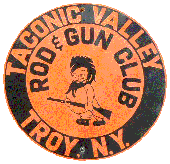
|
In the month of February 1776 the English
Parliament had passed a law authorizing
George III to treat all Americans captured in
arms at sea as "traitors, pirates and
felons." This circumstance more than any
other made me the declared enemy of Great
Britain. Never before had history furnished
an example of a people so arrogant as to
claim sovereignty of the seas! Never before
had it revealed premeditated cruelty such as
that which anticipates the crime. From the
beginning of the war in America the exchange
of prisoners from the ground forces had been
arranged between General Washington and the
English generals. Despite all her pride Great
Britain had been obliged to respect these
arrangements and to consider as prisoners of
war all the Americans who were captured while
in the army; but it was not the same for
service at sea. To be taken with arms in hand
against England on her pretended empire of
the ocean was an unforgivable crime according
to the published annals of her Parliament. If
at the time of this act of Parliament the
strength of the English navy had been
compared with that of the American navy, a
relationship of a hundred to one would have
been found. Noble sons of liberty, may this
be the basis of your glorious renown. May
your enemies remember forever how their
cruelties were exercised in vain! That far
from abating your courage, they forced you,
with your tremendous acts of heroism, to
sustain the American flag on the oceans that
the author of nature created free. Cruelty
and fear have always been companions. Only
fear has prevented England from giving to the
world, for a second time on the occasion of
this war, the revolting spectacle of the
horrors that ravaged Scotland in 1745. How
great would have been the satisfaction of
this people, as ferocious as they are
vindictive, if they could have hanged until
half dead the Americans captured at sea, then
cut open their breasts with a knife, and
thrown their beating hearts into the flames!
If they did not dare attempt this, they did
throw a number of American citizens into
English prisons where they were kept for five
full years, suffered from cold, hunger, and
beating, and endured all kinds of outrages.
Some of these unfortunate men were sold on
the coast of Africa and others were
transported to India. The firmness with which
these patriot martyrs sustained all these
reverses is unexampled. They preferred
persecution to saving themselves by serving
in the English navy.
Captain John Paul Jones
Yankee Doodle
Father and I went down to camp,
Along with Captain Gooding;
And there we saw the men and boys,
As thick as hasty pudding.
Yankee doodle, keep it up,
Yankee doodle dandy;
Mind the music and the step,
And with the girls be handy.
There was Captain Washington
Upon a slapping stallion,
A-giving orders to his men,
I guess there was a million.
And then the feathers on his hat,
They looked so' tarnal fin-a,
I wanted pockily to get
To give to my Jemima.
And then we saw a swamping gun,
Large as a log of maple;
Upon a deuced little cart,
A load for father's cattle.
And every time they shoot it off,
It takes a horn of powder;
It makes a noise like father's gun,
Only a nation louder.
I went as nigh to one myself,
As' Siah's underpinning;
And father went as nigh agin,
I thought the deuce was in him.
We saw a little barrel, too,
The heads were made of leather;
They knocked upon it with little clubs,
And called the folks together.
And there they'd fife away like fun,
And play on cornstalk fiddles,
And some had ribbons red as blood,
All bound around their middles.
The troopers, too, would gallop up
And fire right in our faces;
It scared me almost to death
To see them run such races.
Uncle Sam came there to change
Some pancakes and some onions,
For' lasses cake to carry home
To give his wife and young ones.
But I can't tell half I see
They kept up such a smother;
So I took my hat off, made a bow,
And scampered home to mother.
Cousin Simon grew so bold,
I thought he would have cocked it;
It scared me so I streaked it off,
And hung by father's pocket.
And there I saw a pumpkin shell,
As big as mother's basin;
And every time they touched it off,
They scampered like the nation.
Yankee doodle, keep it up,
Yankee doodle dandy;
Mind the music and the step,
And with the girls be handy.
|
|
 Taconic
Valley Rod & Gun Club Taconic
Valley Rod & Gun Club 
Eagle Mills, New York
Revolution
|
|
The work is done, and well done. Bring me
my horse.
~~ General George
Washington

|
Birth of a Nation
|
|
The French and Indian War
|
|
1749
|
The French establish Fort La
Presentation, NY extending French
influence over the western nations of
the Iroquois Confederacy. Captain
Pierre Celoron leads 250 French and
Indians up the St. Lawrence, across
Lakes Ontario and Erie and over the
Chautauqua Portage Road to reach the
headwaters of the Ohio River. Celoron
plants lead plates along the Ohio
claiming the land for France.
|
|
October, 1753
|
French Capt. Marin builds Fort
Presqu'ile, Fort Le Boeuf and the
Lake Erie-French Creek portage Road.
Governor Dinwiddie of Virginia sends
Colonel George Washington to tell the
French to stop building forts in the
Ohio Valley. The French pay no
attention to the warning.
|
|
1754
|
The French reinforce their forces in
the Ohio via lakes Ontario and Erie
and build Fort Machault. Washington
builds Fort Necessity.
|
|
May 27, 1754
|
Washington surrenders Fort Necessity.
|
|
July 9, 1755
|
Washington loses the Battle of the
Wilderness. Washington warns Gen.
Braddock that the French and Native
Americans fight from behind trees
instead of marching into battle.
Braddock's army is surprised and
Braddock is killed.
|
|
Summer, 1755
|
Seven thousand French peasants living
in Nova Scotia (Arcadians) are
rounded up and sent away from their
homes by the British.
|
|
May, 1756
|
England and France formally declare
war.
|
|
1755-57
|
The French win battle after battle.
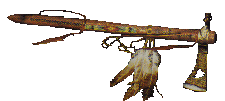
Marquis de Montcalm attacks several
British forts, among them Fort
William Henry. The British commander
surrenders on the condition that
British troops will be treated
fairly. The French's Indian allies
promptly kill more than 1,000 British
soldiers and settlers alike.
|
|
1758
|
British General James Wolfe captures
Fort Duquesne, PA.
|
|
July 1758
|
British Generals Jeffrey Amherst and
James Wolfe capture the Fortress of
Louisbourg.
|
|
October, 1758
|
Peace is made between the Native
Americans in the Ohio Valley and the
British.
|
|
September 13, 1759
|
Gen. Wolfe defeats the French at
Quebec. Gen. Wolfe is killed and
French Commander Marquis de Montcalm
dies the next day.
|
|
October, 1759
|
Gen. Amhurst defeats the French at
Fort Carillon and renames it Fort
Ticonderoga.
|
|
September 1760
|
The French army formally surrenders
to Gen. Amherst in Montreal.
|
|
February, 1763
|
The Peace of Paris awards all of
North America east of the Mississippi
River except New Orleans, including
Canada and Florida to the
British.
The British Parliament decides it
will repay their accrued war debt by
levying a series of taxes on the
colonies, being as they are the
primary beneficiaries of the
successful prosecution of the war.
Taxes are imposed on a number of
items, including legal documents and
tea. Stamps are issued to be affixed
onto legal documents and newspapers.
|
|
The American Revolution
|
|
1733
|
Molasses Act; heavy tax duty on all
sugar, molasses, and rum imported
into the American colonies from
non-British islands in the Caribbean.
|
|
1754-63
|
French and Indian War.
|
|
1763
|
Proclamation of 1763; closes off the
frontier to colonial expansion.
|
|
1764
|
Sugar Act; heavy tax duties on sugar,
textiles, coffee, indigo, and wine
imported to the American colonies
from foreign countries to help pay
the costs of keeping British troops
in America.
Currency Act; forbids the colonists
from printing or using their won
money.
|
|
March 22, 1765
|
Stamp Act; heavy tax duties on every
piece of printed paper, Ship's
papers, legal documents, licenses,
newspapers, publications, and playing
cards.
|
|
May, 1765
|
Quartering Act; British troops must
be given housing on demand from
colonists.
|
|
March 18, 1766
|
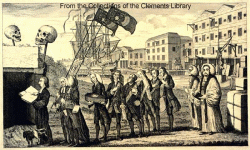
The Funeral of Miss Anne
Stamp ~~ Benjamin Wilson
The Stamp Act is Repealed.
Declaratory Act; Parliment declares
sovereignty over colonies in all
cases.
|
June 26, 29,
July 2,
1767
|
Townshend Revenue Acts; courts sit
without juries, taxes on paper, lead,
glass and tea shipped from England.
Repealed April 12, 1770.
|
|
March 5, 1770
|
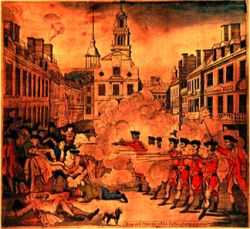
The Bloody Massacre ~~ Paul
Revere
British Soldiers kill five colonists
in the Boston Massacre.
|
|
May 16, 1771
|
Battle of Alamance NC; Royal Governor
Tryon defeates 2,000 Regulators,
ending the War of the Regulation.
First battle against Britain fought
in the colonies.
|
|
May 10, 1773
|
Tea Act; East India Tea Company
granted sole right to sell tea
directly to Americans.
|
|
December 16, 1773
|
The Boston Tea Party.
|
|
March-June, 1774
|
Coercive Acts (Intolerable Acts);
Closes Boston Harbor, eliminates
current government of Massachusetts,
restricts many other government
functions.
-
Boston Port Act; March 31, 1774
-
Massachusetts Government Act; May
20, 1774
-
Administration of Justice Act;
May 20, 1774
-
Quartering Act; June 2, 1774
-
Quebec Act; June 22, 1774
|
|
September 5 - October 26, 1774
|
First Continental Congress Meets in
Philadelphia.
Declaration of Resolves stated that
colonists shall stay loyal to the
crown, but the colonies have the
power to make their own decisions,
also known as continental rights, and
the colonies also banned trade with
Great Britain.
Those who give up essential
liberty, to preserve a little
temporary safety, deserve neither
liberty nor safety.
We must all hang together or
assuredly we will hang
separately.
~~ Benjamin Franklin
|
|
October 10, 1774
|
Battle of Point Pleasant WV;
Americans win.
|
|
April 18, 1775
|
Paul Revere and William Dawes
Ride.
~~ One if by land two if by
sea.
|
|
April 19, 1775
|
Battles of Concord and Lexington;
British retreat.
British Gen. Pitcairn is dispatched
to Massachusetts with 700 Red Coats
to destroy military supplies at
Concord and to kill Patriot leaders
Sam Adams and John Hancock.
By the rude bridge that arched
the flood
Their flag to April's breeze
unfurled,
Here once the embattle farmers
stood,
And fired the shot heard round the
World.
~~ Ralph Waldo Emerson
|
|
May 10, 1775
|
Second Continental Congress Meets in
Philadelphia. Congress decides to
form the Continental army.
|
|
May 11, 1775
|
Battle of Crown Point; Green Mountain
Boys & Ethan Allen attack the
British Fort Ticonderoga near Lake
Champlain and win.
|
|
June 15, 1775
|

Second Continental Congress names
former British officer George
Washington as Commander-in-Chief of
the Continental Army.
I do not think myself equal to
the command I am honored with.
~~ Gen. George Washington
|
|
June 17, 1775
|
Battle of Bunker Hill/Breed's Hill;
Americans retreat.
~~ Don't fire until you see the
whites of their eyes!
|
|
November 13 , 1775
|
The Patriots under Gen. Montgomery
occupy Montreal, Canada.
|
|
November 28, 1775
|
The American Navy is established by
Congress.
Resolved, That a swift sailing
vessel, to carry ten carriage guns,
and a proportionable number of
swivels, with eighty men, be fitted,
with all possible despatch, for a
cruise of three months, and that the
commander be instructed to cruize
eastward, for intercepting such
transports as may be laden with
warlike stores and other supplies for
our enemies, and for such other
purposes as the Congress shall
direct.
|
|
December 9, 1775
|
The Battle of Great Bridge VA;
Americans win.
|
|
December 22, 1775
|
American Prohibitory Act; Parliament
prohibits all British trade with the
American colonies, all American ships
and cargoes are subject to seizure.
|
|
December 25, 1775
|
The "Crown Post" closes throughout
the United States.
|
|
December 31, 1775
|
American army invades Canada and
tries to take Quebec but fails.
|
|
January 9, 1776
|
Thomas Paine publishes Common
Sense.
We have it in our power to
begin the world anew...American shall
make a stand, not for herself alone,
but for the world.
|
|
February 27, 1776
|
Militia beat Tories at the battle of
Moore's Creek Bridge, NC.
|
|
March 3, 1776
|
The Continental Fleet captures New
Providence Island in the Bahamas.
|
|
March 4, 1776
|

Battle of Dorchester Heights, MA;
British sail away.
Henry Knox drags 50 cannons by sled
over 300 miles to the hills
overlooking the harbor. British
General Howe Evacuates Boston and
sails to Halifax, Nova Scotia.
|
|
July 4, 1776
|
Declaration of Independence.
All men are created equal and
have the right to life, liberty, and
the pursuit of happiness.
~~ Thomas Jefferson
|
|
July 9, 1776
|
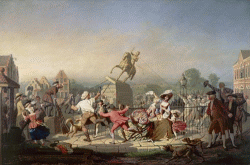
Bowling Green NYC; a crowd of
Americans topple, and smash the huge
statue of King George III to pieces.
The pieces are carted off and melted
down into musket balls.
We know the race is not to the
swift
nor the battle to the strong.
Do you not think an angel
rides in the whirlwind and directs
this storm?
~~ John Page
|
|
August 22, 1776
|
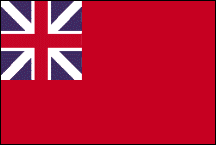
30,000 British troops arrive in New
York harbor.
The enemy have now landed on Long
Island and the hour is fast
approaching on which the honor and
success of his army and the safety of
our bleeding country depend.
Remember, officers and soldiers, that
you are freemen fighting for the
blessings of liberty; that slavery
will be your portion and that of your
posterity if you do not acquit
yourselves like men.
~~ Gen. Washington
|
|
August 26-29, 1776
|
Battle of Long Island/Brooklyn
Heights; Americans defeated.
Washington weeps while watching
through a spyglass as the British
massacre Americans who have
surrendered. But Washington often
reminds his men that they are an army
of liberty and freedom, and that the
rights of humanity for which they are
fighting should extend even to their
enemies.
Good God, what brave fellows I
must this day lose!
~~ Gen. Washington
Washington now changes tactics,
avoiding large scale battles with the
British by a series of retreats.
|
|
September 6, 1776
|
Connecticut inventor David Bushnell
takes his submarine the Turtle into
New York Harbor where Sergeant Ezra
Lee tries to sink the HMS Eagle,
flagship of the British Fleet, but
fails.
|
|
September 15, 1776
|
The British occupy New York City.
|
|
September 16, 1776
|
Battle of Harlem Heights; British
repulsed.
|
|
September 22, 1776
|
Lieutenant Nathan Hale is hanged.
~~ I only regret that I have
but one life to lose for my
country.
|
|
October 11, 1776
|
Battle of Valcour Bay; Americans
Retreat.
Brigadier General Benedict Arnold
holds Fort Ticonderoga and the
British invasion is halted.
|
|
October 28, 1776
|
Battle of White Plains, NY; Americans
defeated.
|
|
November 16, 1776
|
British capture Fort Washington, NY
and Fort Lee, NJ.
These are the times that try
men's' souls.
~~ Thomas Paine
|
|
December 6, 1776
|
The American naval base at Newport,
RI, is captured by the British.
|
December 25 - January 3
1776-77
|

Crossing of the Delaware &
Battles of Trenton and Princeton, NJ;
Americans win.
Its a fine fox hunt, boys!
~~ Gen. Washington
|
|
January 1777
|
Patriot winter Quarters at Morristown
NJ.
|
|
April 26, 1777
|
Danbury CT; Burned by the British.
|
|
June 14, 1777
|
Congress declares that the flag of
the United States will consist of
thirteen alternating red and white
stripes, and a blue field with
thirteen white stars.
|
|
June 27, 1777
|
British Gen. Johnny Burgoyne arrives
at Crown Point, NY.
|
|
July 5, 1777
|
Gen. Burgoyne captures Fort
Ticonderoga.
|
|
July 27, 1777
|
Marquis de Lafayette arrives in
Philadelphia.
|
|
July 29, 1777
|
Patriot Col. Peter Gansevoort reports
that two young girls are scalped and
killed while picking berries outside
Fort Stanwix, NY.
|
|
August 3, 1777
|
Col. Gansevoort and the Americans
hold Fort Schuyler in the Mohawk
Valley.
|
|
August 6, 1777
|
Battle of Oriskany, NY; Americans
retreat.
British Lieutenant Colonel Barry St.
Leger returns to Fort Oswego. The
British army in the Mohawk Valley
fails to keep its rendezvous with
Gen. Burgoyne at Albany, a failure
that will contribute to the British
defeat at Saratoga, NY.
|
|
August 16, 1777
|
Battle of Bennington, VT; American
Militia under General Stark crush the
Hessians, Americans win.
|
|
August 23, 1777
|
Gen. Benedict Arnold captures Fort
Stanwix, NY.
British Major General William Howe's
fleet arrives at Head of Elk,
Maryland.
|
|
September 11, 1777
|
Battle of Brandywine Creek, PA ;
Americans defeated.
The moment I heard of America,
I loved her;
the moment I knew she was fighting
for freedom,
I burnt with a desire of bleeding
for her.
~~ Marquis de Lafayette
|
|
September 16, 1777
|
Battle of the Clouds Lancaster, PA;
Rain forces both sides to
withdraw.
Congress flees to Lancaster, PA and
later to the more remote town of
York.
|
|
September 19, 1777
|
Battle of Freeman's Farm Saratoga,
NY; British hold the field.
Patriot General Horatio Gates loses
an indecisive battle, Colonel Daniel
Morgan and his rifle regiment run low
on ammunition and are outflanked,
they must withdraw. Major General
Benedict Arnold is relieved of
command.
|
|
September 21, 1777
|
Paoli Massacre; No Flint Grey
bayonets 53 Americans to death and
bayonets or burns over 100 who try to
surrender. For the rest of the war,
the British fear that Gen. Mad
Anthony Wayne will avenge the martyrs
of Paoli, PA.
|
|
September 26, 1777
|
British under Gen. Howe occupy
Philadelphia.
|
|
October 4, 1777
|
Battle of Germantown, PA; Americans
retreat.
|
|
October 6, 1777
|
Battles of Fort Montgomery and Fort
Clinton; British General Henry
Clinton attacks the Hudson Highlands,
hoping to force a connection to
Albany and relieve Gen. Burgoyne.
British, Tory and Hessian troops
overrun the forts, forcing both
garrisons to surrender. NY Governor
George Clinton, Col. John Lamb, and
others flee in the chaos to avoid
capture.
|
|
October 7, 1777
|
Battle of Bemis Heights Saratoga, NY;
British run for the hills.
Gen. Arnold sees an opportunity to
seize the offensive while Gen.
Burgoyne is vulnerable and leads a
counterattack. The following night
Gen. Burgoyne retreats to
fortifications at Saratoga, NY, where
the American force, which now numbers
20,000 surrounds the British force of
6,000.
|
|
October 16, 1777
|
Kingston, NY; burned by the British.
|
|
October 17, 1777
|
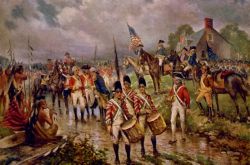
Burgoyne's surrender at
Saratoga ~~ Percy Moran
Gen. Burgoyne surrenders.
The ability of America's militiamen
to come together quickly at a certain
locale for a limited period of time
was enough to confound and defeat the
British.
|
|
November 15, 1777
|
Congress adopts the Articles of
Confederation.
|
|
November 16, 1777
|
General Thomas Mifflin delays the
British supply ships at Philadelphia
on the Delaware river.
|
|
December 19, 1777
|
Encampment at Valley Forge for the
Winter.
You might have tracked the
army from White Marsh to Valley Forge
by the blood of their feet.
~~ Gen. Washington
|
|
December 21, 1777
|
Heartily wish myself at home,
my Skin and eyes are almost spoil'd
with continual smoke. A general cry
thro' the Camp this Evening among the
Soldiers, "No Meat! No Meat!" - the
Distant vales Echo'd back the
melancholy sound - "No Meat! No
Meat!" Immitating the noise of Crows
and Owls, also, made a part of
confused Musick. What have you for
your dinner boys? "Nothing but Fire
Cake and Water, Sir."
~~ Albigence Waldo's Diary
|
|
February 6, 1778
|
Ben Franklin encourages France to
sign The French Alliance with the
United States.
Thomas Jefferson persuades Virginia
to end the importation of slaves.
|
|
February 23, 1778
|
Baron von Steuben of Prussia arrives
at Valley Forge to join the
Continental Army.
|
|
April 30, 1778
|
Polish military engineer Colonel
Thaddeus Kosciuszko places a 500-yard
65 ton chain across the Hudson River
between West Point and Constitution
Island.
|
|
May 25, 1778
|
Battle of Freetown, MA; British
retreat.
|
|
May 30, 1778
|
Cobleskill, NY; Burned by Chief
Joseph Brant and 300 Iroquois
Indians, 22 Continentals are ambushed
and killed.
|
|
June 14, 1778
|
France declares war on Britain.
|
|
June 19, 1778
|
Evacuation of Valley Forge Winter
Quarters.
|
|
June 28, 1778
|
Battle of Monmouth, NJ; Americans
win.
Molly Pitcher, wife of John Hayes,
brings water to the troops from a
nearby spring and takes over her
husband's place at a cannon when he
is wounded.
Gen. Washington rides all over the
field, sometimes under fire, and
orders the Americans into a strong
defensive line.
Sir, they are able, and by God
they shall do it!
~~ Gen. Washington
|
|
July 3, 1778
|
British Loyalist Tories and Indians
massacre American settlers in the
Wyoming Valley of northern
Pennsylvania.
Gen. Washington establishes West
Point, NY as his headquarters.
|
|
November 11, 1778
|
Cherry Valley, NY; Tory Captain
Walter Butler's regiment of rangers
and Mohawk War Chief Joseph Brant
attack the settlement, massacreing
47, including 32 noncombatants,
mostly by tomahawk.
November 13th. In the
afternoon and morning of the 13th we
sent out parties after the enemy
withdrew; brought in the dead; such a
shocking sight my eyes never beheld
before of savage and brutal
barbarity; to see the husband
mourning over his dead wife with four
dead children lying by her side,
mangled, scalpt, and some their
heads, some their legs and arms cut
off, some torn the flesh off their
bones by their dogs-12 of one family
killed and four of them burnt in his
house.
~~ Diary of Patriot Captain Benjamin
Warren
|
|
November 16, 1778
|
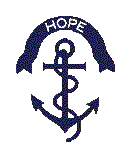
I wish to have no connection with any
ship that does not sail fast;
for I intend to go in harm's way.
~~ John Paul Jones - letter to
M. Le Ray de Chaumont
|
|
December 1778
|
Patriots winter encampment at
Middlebrook NJ.
|
|
December 29, 1778
|
British take Savannah, GA.
|
|
January 1779
|
Lafayette goes to France to plead for
help.
|
|
February 1779
|
I do solemnly declare that I
did not put a single morsel of
victuals into my mouth for four days
and as many nights, except a little
black birch bark which I gnawed off a
stick of wood, if that can be called
victuals. I saw several of the men
roast their old shoes and eat them,
and I was afterwards informed by one
of the officers' waiters, that some
of the officers killed and ate a
favorite little dog that belonged to
one of them. If this was not
"suffering" I request to be informed
what can pass under that name. If
"suffering" like this did not "try
men's souls," I confess that I do not
know what could.
~~ Joseph Plumb Martin's
Diary
|
|
February 14, 1779
|
Militia beat Tories at Kettle Creek,
NC.
|
|
February 25, 1779
|
George Rogers Clark captures
Vincennes, OH on the Wabash in the
Western campaign.
|
|
March 3, 1779
|
Battle of Brier Creek GA; Americans
defeated.
General John Ashe flees the scene of
the battle. Colonel Samuel Elbert and
the Georgia militia defend the camp
until almost all are dead.
|
|
May 10, 1779
|
American General Benedict Arnold
offers to surrender West Point to
British General Clinton for 10,000
pounds.
Portsmouth and Norfolk, VA; burned
by the British.
|
|
June 16, 1779
|
Spain declares war on Great Britain.
|
|
July 8, 1779
|
Fairfield, CT; burned by the British.
|
|
July 11, 1779
|
Bedford Village, NY; burned by
British Col. Banastre Tarleton.
|
|
July 14, 1779
|
Tory Lt. Henry Hare and Sgt. Newbery
of Butler's Rangers are captured and
courtmartialed as spies. Both men are
held responsible for their roles in
the Cherry Valley Massacre, and are
hanged at Canajoharie, NY.
|
|
August 28, 1779
|
Continental troops raid and burn the
village of Chemung, NY.
|
|
August 29, 1779
|
Battle of Chemung, NY; Americans
win.
American Generals John Sullivan and
James Clinton defeat the combined
Indian and Loyalist forces at Elmira,
NY. American troops then head
northwest and destroy nearly 40
Cayuga and Seneca Indian villages in
retaliation for the campaign of
terror against American settlers.
|
|
September 23, 1779
|
John Paul Jones's Bonhomme Richard
captures the British frigate Serapis
off Flamborough Head.
~~ I have not yet begun to
fight.
|
|
September 28, 1779
|
No Flint Grey kills 30 Americans by
bayonet in the Tappan Massacre, River
Vale, NJ.
Samuel Huntington esq. is elected
President of the Continental
Congress.
|
|
October 17, 1779
|
Washington sets up winter quarters at
Morristown, NJ, where his troops will
suffer another harsh winter without
desperately needed supplies,
resulting in low morale, desertions
and attempts at mutiny.
|
|
December 1779
|
Patriots winter encampment at
Morristown NJ.
|
|
May 12, 1780
|
British take Charlestown, SC. Gen.
Henry Clinton's capture of Charleston
costs America 6,000 of her best
troops, Clinton returns to New York
City, leaving Lt. Gen. Charles Earl
Cornwallis in charge.
|
|
May 20, 1780
|
Battle of Waxhaw Creek, SC; Americans
defeated.
British dragoons under Col. Banastre
Tarlton kill 250 Virginians after
Patriot Col. Abraham Buford
surrenders.
|
|
June 1780
|
The Dutch Republic declares war on
Great Britain.
|
|
June 20, 1780
|
Patriots rout Tories at Ramseur's
Mill, NC.
|
|
June 23, 1780
|
Battle of Springfield, NJ; Americans
win.
|
|
July 10, 1780
|
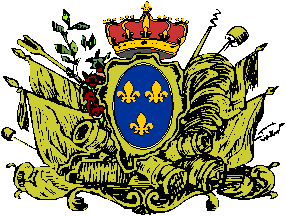
Expédition Particulière
begins;
French Lieutenant General Vicomte de
Rochambeau arrives with a French Army
of 5,500 men at Newport, Rhode Island
to join the allied cause.
|
|
July 11, 1780
|
Norwalk, CT; burned by the British.
|
|
July 15-16, 1780
|
Mad Anthony Wayne captures Stony
Point, NY; Americans win.
|
|
August 6, 1780
|
Battle of Hanging Rock, SC; Americans
win.
|
|
August 8, 1780
|
Battle of Piqua, Ohio; George Rogers
Clark defeates the Shawnee and Mingo
Indians.
|
|
August 16, 1780
|
Battle of Camden, SC; Americans
defeated by British Gen.
Cornwallis.
Gen. Gates suffers the worst
battlefield disaster of the
Revolution.
|
|
August 19, 1780
|
Light Horse Harry Lee attacks Paulus
Hook, NJ, but has to retreat.
|
|
September 23, 1780
|
Benedict Arnold's plot to surrender
West Point is foiled.
British Loyalist Major John Andre is
hanged as a spy at noon on October 2,
1780.
|
|
October 7, 1780
|
Battle of King's Mountain, SC;
British defeated.
|
|
January 12, 1781
|
British Lt. Colonel Tarleton begins
his pursuit of Colonel Daniel
Morgan. Tarleton crosses the Broad
River and works his way north, while
General Cornwallis moves north from
Winnsboro SC, on the eastern side of
the Broad River. They plan to
parallel each other, but Cornwallis
is forced to slow his march to allow
General Alexander Leslie and
reinforcements to catch up. On
January 16, Lt. Colonel Tarleton is
now so close that he marches his men
into what had been Morgan's camp and
enjoys the Americans' breakfast on
still hot fires. Morgan is only
twenty miles ahead.
|
|
January 17, 1781
|
Battle of Cowpens, SC; British &
Col. Tarleton defeated.
After one hour of ferocious
fighting, Tarleton flees the field at
8:00 A.M.
During the French and Indian War
Daniel Morgan ran supply wagons for
the British. In the spring of 1756,
he had a run in with a British
Lieutenant who struck Morgan with the
flat of his sword, and Moragan
promptly knocked him out. This earned
him five hundred lashes. Morgan would
always remark that the drummer boy
only counted four hundred
ninety-nine. Before the battle he
will walk among his soldiers and tell
them that he owed King George a lash,
and it would be
A Devil of a Whipping.
~~ Col. Daniel Morgan - The Old
Wagoner
|
|
January - February 1781
|
Gen. Greene and Gen. Cornwallis race
to the Dan River on the Virginia
border. Cornwallis fails to catch up
and Greene and Colonel Otho Williams
cross the Dan River into Virginia on
February 14.
|
|
February, 1781
|
Lafayette is ordered to Virginia to
oppose British forces operating there
under Benedict Arnold.
|
|
Febuary 25, 1781
|
Battle of Haw River, SC; Americans
win.
Gen. Lighthorse Harry Lee is
mistaken for a Loyalist, he rides
right up to the Tory lines and shakes
Colonel Pyle's hand.
|
|
March 2, 1781
|
Articles of Confederation adopted by
the United States Congress.
|
|
March 15, 1781
|
Battle of Guilford Court House, NC;
Americans defeated.
British victory is pyrrhic, his
ranks depleted and his supplies
exhausted, Cornwallis withdraws to
Wilmington.
I never saw such fighting,
since God made me.
~~ Gen. Cornwallis
Gen. Nathaniel Greene retreats to
Speedwell's iron-works, on
Troublesome Creek.
We fight, get beat, rise, and
fight again.
~~ Gen. Greene
|
|
April 20, 1781
|
Battle of Fort Watson, SC; British
surrender.
Lt. Col. Hezekiah Maham constructs a
tower for the American troops to fire
down into the fort.
|
|
May 10, 1781
|
Louisiana Spanish Governor Don
Bernardo de Gálvez captures
Pensacola and West Florida.
|
|
May 20, 1781
|
Gen. Cornwallis assumes overall
command of all British forces in
Virginia.
His campaign of economic and
military destruction begins.
|
|
May 21, 1781
|
Washington and Rochambeau meet at
Wethersfield CT.
A decision is made to attack New
York City.
|
|
June 4, 1781
|
British forces under Col. Banastre
Tarleton raid Charlottesville, VA,
capturing several legislators,
including Yorktown's Dudley Digges
and Daniel Boone.
Governor Thomas Jefferson escapes by
hiding in the woods near Monticello.
|
|
June 6, 1781
|
British hold off Americans at Ninety
Six, SC.
Americans recapture Augusta, GA.
|
|
July 6, 1781
|
Battle of Greenspring, VA; Mad
Anthony Wayne and his command are
hemmed in by British Gen. Cornwallis
near Jamestown, but he manages to
escape with his men.
|
|
August 1, 1781
|
Cornwallis occupies Yorktown, VA,
planning to use the port as his base
for resupply as he continues his
Virginia campaign.
|
|
August 4, 1781
|
Patriot Colonel Isaac Hayne is hung
by a drumhead trial in Charleston SC.
|
|
August 14, 1781
|
Washington and Rochambeau abruptly
change plans after receiving a letter
from French Admiral Comte de Grasse.
They leave White Plains, NY and begin
their march to Yorktown VA.
|
|
August 25, 1781
|
French Admiral Comte de DeBarras
leaves Newport, Rhode Island with
supplies and heavy siege guns for the
Patriot army.
|
|
August 29, 1781
|
French Admiral Comte de Grasse
arrives;
A powerful French fleet, 28
battleships, many support vessels and
a 3,000 man army arives from the
Caribbean and blockades the British
naval force from entering the
Chesapeake Bay.
|
|
August 31, 1781
|
British Admirals Graves and Hood take
the British fleet out of New York and
head for Virginia.
|
|
September 2-4, 1781
|
The Allied Army marches through
Philadelphia, PA greeted with
acclamation and joy.
|
|
September 5, 1781
|
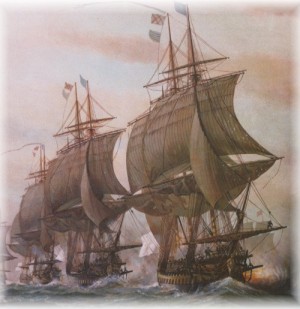
The Second Battle of the
Virginia Capes ~~ Zveg
Battles of the Capes; British and
French naval forces clash.
Fleets maintain contact for several
days. As the battle fleets are
engaged, DeBarras and the supply
fleet enter the Chesapeake Bay, and
sail to the James River. Ultimately,
Graves returns to New York for
repairs, and DeGrasse returns to the
Chesapeake Bay to resume the
blockade.
|
|
September 6, 1781
|
Battle Of Groton Heights, CT;
Americans defeated.
160 Patriots are bayoneted by the
Red Coats under the command of
British General Benedict Arnold. When
Colonel Ledyard surrenders Fort
Griswold, a British officer runs him
through with his own sword.
Freedman Lambo Latham,
although injured, kills the British
officer with his bayonet. He is then
stabbed by British bayonets 33
times.
If I have this day to lose either
life or honor,
you who know me best know which it
will be.
~~ Patriot Col. William
Ledyard
New London, CT; burned by the
British.
|
|
September 8, 1781
|
Battle of Eutaw Springs, SC;
Americans win.
Swamp Fox General Francis Marion
surprises British Lieutenant Colonel
Alexander Stewart.
Hold up the glories of thy
dead,
Tell how thy elder children
bled,
And point to Eutaw's battle-bed.
Carolina! Carolina!
~~ Henry Timrod
|
|
September 18, 1781
|
Washington, Rochambeau and Knox meet
on DeGrasse's flagship, the Ville de
Paris at Hampton Roads for a final
strategy meeting.
|
|
September 20, 1781
|
Allied troops begin to arrive in
Williamsburg, VA.
|
|
September 28, 1781
|
Allied troops, 17,000 strong, begin
to arrive in Yorktown.
With fav'ring breezes steer
their way,
And crowd with ships the spacious
bay.
Lo! Washington from northern
shores,
O'er many a region wheels his
force,
And Rochambeau with legions
bright
Descends in terror to the fight.
~~ John Trumbull
|
|
September 30, 1781
|
Gen. Washington sends Gen. de Choisy
with Duke de Lauzun's Cavalry across
the James River to keep Col.
Tarltons' dragoons bottled up at
Gloucester.
Gen. Cornwallis orders the outer
works to be abandoned under the cover
of nightfall.
|
|
October 5, 1781
|
The Siege of Yorktown begins;
We now began to make
preparations for laying close siege
to the enemy. We had holed him and
nothing remained but to dig him out.
Accordingly, after taking every
precaution to prevent his escape,
[we] settled our guards, provided
fascines and gabions, made platforms
for the batteries, to be laid down
when needed, brought on our battering
pieces, ammunition, &c. On the
fifth of October we began to put our
plans into execution.
~~ Joseph Plumb Martin
|
|
October 9, 1781
|
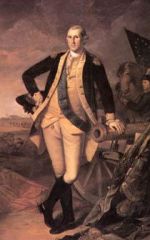
Gen. George Washington ~~
John Trumbull
The bombardment of Yorktown begins;
Comte de Saint-Simon's battery opens
fire.
About 3 o'clock P.M. the
French opened a battery on our
extreme left of Sixteen 12 pounders,
and Six Morters and Howitzers and at
5 o'clock an American battery of Six
18s and 24s - four Morters and 2
Howitzers began to play from the
extremity of our right. Both with
good effect as they compelled the
Enemy to withdraw from their
ambrazures the Pieces which had
previously kept up a constant
firing.
~~ Gen. Washington's Diary
|
|
October 17, 1781
|
British drummers beat for a
parley.
We have been beating the bush
and the General has come to catch the
bird.
~~ Gen. Nathaniel Greene
|
|
October 19, 1781
|
Gen. Cornwallis surrenders at
Yorktown.
If summer were spring and the
other way round,
Then all the world would be upside
down.
Cornwallis is so badly humiliated by
the defeat that he does not attend
the surrender ceremony. Instead Gen.
Charles O'Hara presents the sword of
surrender to French Gen. Rochambeau
as if to snub the Americans, but
Rochambeau directs O'Hara to Gen.
Washington who directs O'Hara to Gen.
Benjamin Lincoln. This effectively
ends the American Revolution.
The work is done, and well
done. Bring me my horse.
~~ Gen. Washington
|
|
October 25, 1781
|
Gen. Washington's general orders
declare that free blacks in the area
in the wake of the battle of Yorktown
should be left to go where they
please.
|
|
October 30, 1781
|
Battle of Johnstown, NY; Marinus
Willett's force of Continentals and
Levies catches up with the raiding
party led by Walter Butler. The fight
seesaws through the streets of
Johnstown; the Loyalists retreat, and
are pursued by the Patriots. The two
collide at a ford of West Canada
Creek. During the skirmish, Walter
Butler is shot through the head. The
news of Butler's death is more
momentous than the surrender at
Yorktown.
|
|
November 1781
|
Gen. Nathaniel Greene clears the
interior of South Carolina and
Georgia of the British.
It had been happy for me if I
could have lived a private life in
peace and plenty, enjoying all the
happiness that results from a
well-tempered society founded on
mutual esteem. But the injury done my
country, and the chains of slavery
forging for all posterity, calls me
forth to defend our common rights,
and repel the bold invaders of the
sons of freedom.
~~ Gen. Greene
|
|
April 16, 1782
|
Gen. Washington establishes American
army headquarters at Newburgh, NY.
|
|
July 11, 1782
|
British troops leave Savannah, GA.,
troops leave Charleston, SC on
December 18, 1782 and finally New
York, NY on November 25, 1783.
British military efforts now turn to
resisting French and Spanish
expansion.
|
|
November 30, 1782
|
British sign the Articles of
Provisional Peace.
|
|
February 3, 1783
|
Spain recognizes the United States of
America, followed later by Sweden,
Denmark and Russia.
|
|
September 3, 1783
|
Treaty of Peace of Paris; Two years
after the conclusion of the
Revolutionary War, American and
British delegations met in Paris to
formalize Britain's recognition of
the nascent United States of America.
|
|
December 4, 1783
|
General Washington bids his officers
farewell at Fraunce's Tavern, New
York, NY.
With a heart full of love and
gratitude, I now take leave of you. I
most devoutly wish that your later
days may be as prosperous and happy
as your former ones have been
glorious and honorable.
~~ Gen Washington
|
|
 
|
|
















